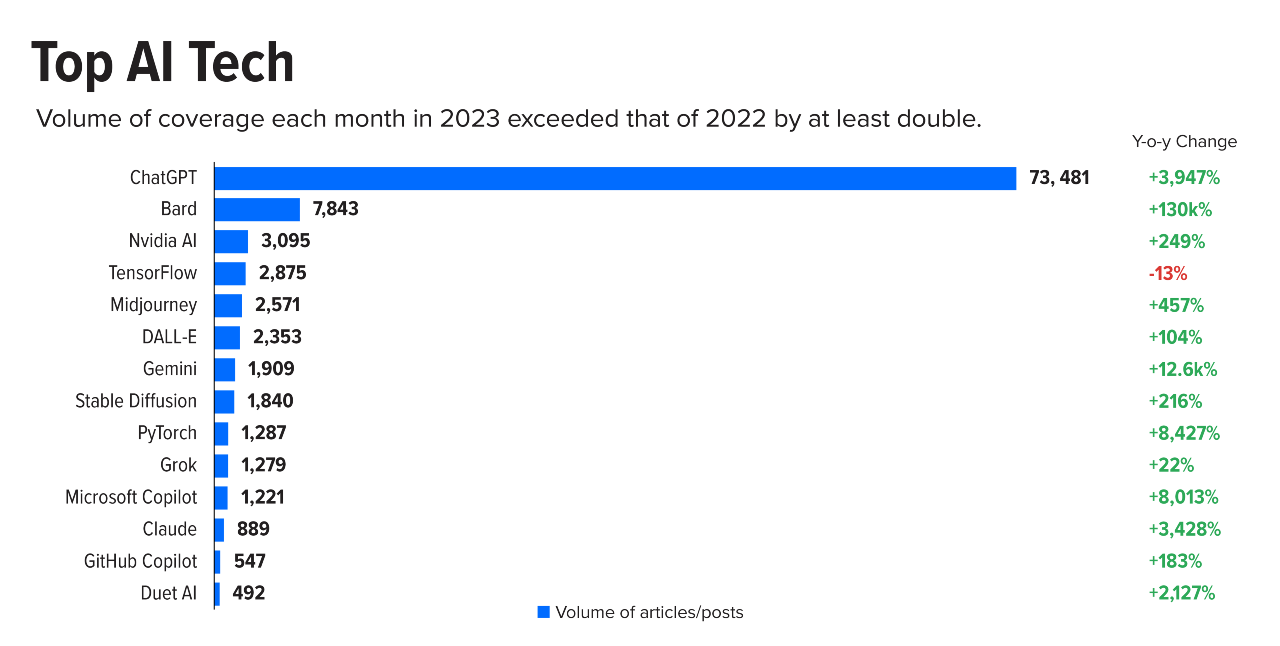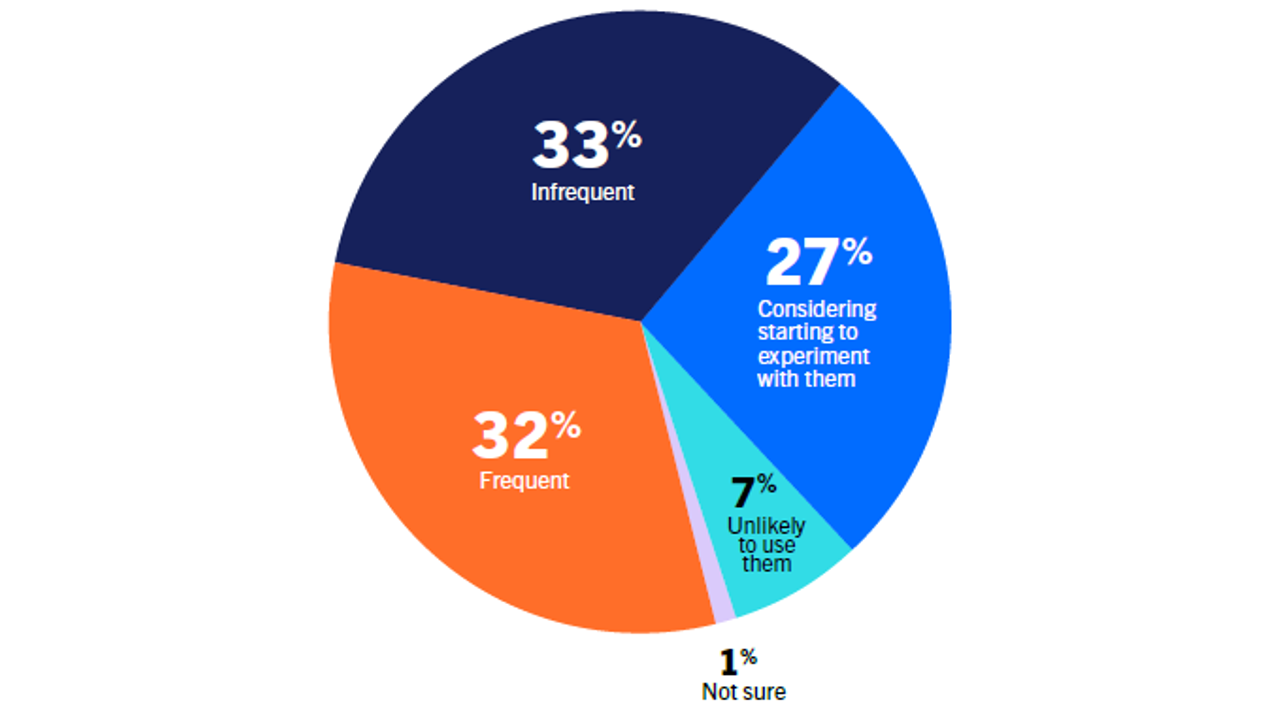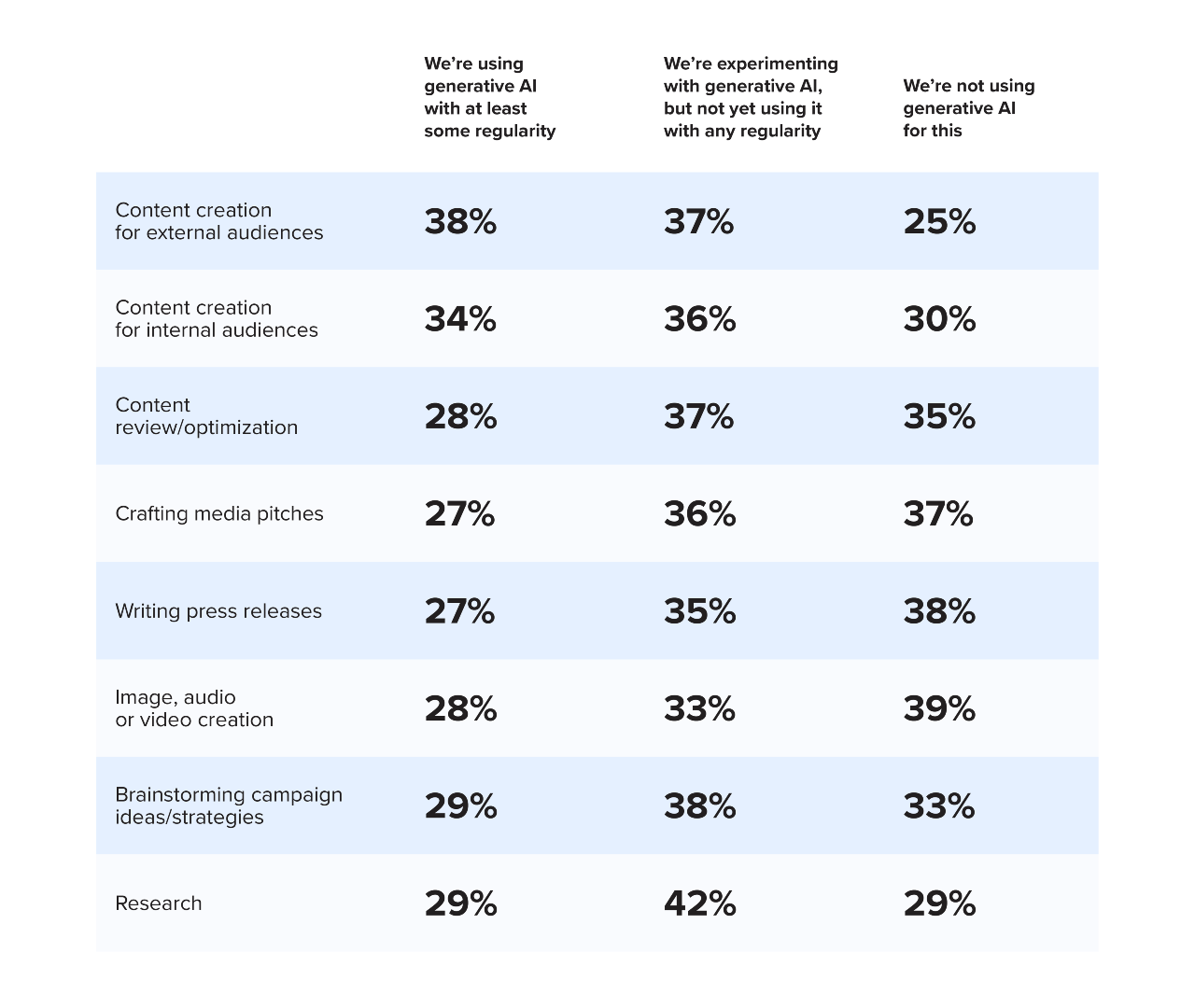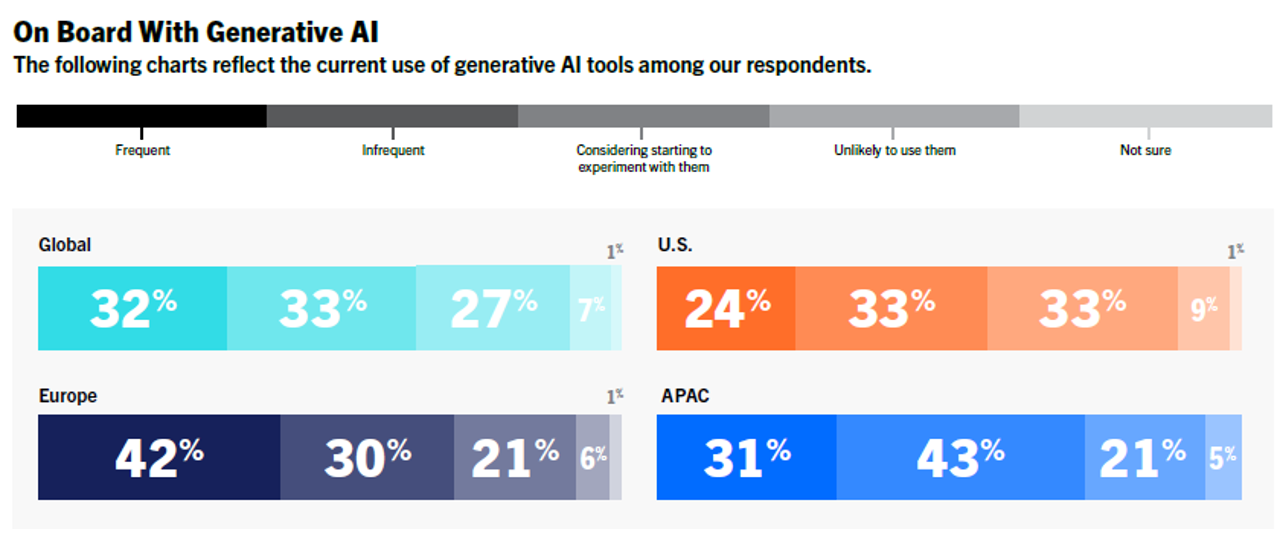Artificial Intelligence (AI) has been with us for some time, with spell checkers, smart speakers. and GPSs utilizing the technology. In PR and communications, it’s been the backbone of sentiment analysis for a decade, but in the last 12 months, generative tools like ChatGPT, Gemini (previously Bard) and Midjourney have opened the doors to content creation at speed and scale.
According to Cision data, OpenAI (the startup behind ChatGPT) dominated AI-related coverage in 2023 with more than 90,000 mentions across online and social media. The tech company saw a 2,126% increase in coverage volume year-on-year (note that ChatGPT only launched in November 2022), driven by the major impact of its generative platform.
Unsurprisingly, OpenAI’s ChatGPT also leads the list of AI-related tech for 2023 – and by some distance. See the top 2023 entries for coverage volume (online articles and social posts) with year-on-year change below.

Coverage and interest in the subject may be sky high, but to what extent have PR and comms professionals bought into generative AI? And is it being integrated into workflows?
Some insight lies in the 2024 Cision and PRWeek Global Comms Report, a survey of more than 400 senior PR and comms professionals across the world that seeks to understand the industry’s biggest trends (including generative AI).
How Comms Teams Are Using Generative AI
For this year’s Global Comms Report, we asked survey respondents to best describe their current usage of generative AI tools. Thirty-two percent of respondents say they use it frequently, 33% use it infrequently, 27% are considering starting to experiment with it, 7% are unlikely to use, and 1% aren’t sure about usage yet.

The report also focuses on eight key functions of PR professionals, and where respondents’ teams used generative AI to help with those functions. A summary of these finding from all global respondents is below:

These results show that content creation has the most uptake when it comes to generative AI. Both content creation for external and internal audiences score highest for regular usage, while crafting media pitches and writing press releases sit at the bottom of list for regularity.
The highest score across all use cases is in research, where 42% say they are experimenting with generative AI but not using with any regularity. In fact, across the board more than a third of respondents for each use case say they are experimenting with generative AI – an indication that we’re still in the early days of adoption in PR.
Global Differences in Generative AI Usage
The above numbers take into account how generative AI is being adopted and used overall; however, if we dive deeper, there are some sharp differences across the regions in terms of generative AI usage. Europe leads the way with 42% saying they are using it frequently, while in APAC that number is 31% and just 24% in the U.S.
The full results can be seen below:

When looking at the specific PR use cases, the U.S. is generally either just behind or far behind in almost all areas of regular use. Just 14% in the U.S. say they are using generative AI regularly for external content creation, compared to 56% in Europe and 63% in APAC.
However, in two of the other use cases (external content creation and brainstorming campaign ideas/strategies), the U.S. is ahead of all other regions in saying they are experimenting with generative AI.
Antony Cousins, Cision’s Executive Director of AI Strategy, noted that the size and scale of organizations in the U.S. “makes the task of fast-paced innovation and adoption of new technology much harder than in Europe and APAC."
“In addition, more high-profile cases of misinformation and deepfakes targeting U.S. brands has probably created more reluctance to rely on AI where coverage of AI in Europe often includes mention of the EU AI act and a strong regulatory stance,” he said.
APAC appears to be the region that’s furthest along in its generative AI journey. In four of the eight use cases given, more than half of respondents said they were using the technology regularly: content creation for external audiences (63%), crafting media pitches (52%), writing press releases (51%), and image, audio or video creation (52%).”
Generative AI in Agency vs. Corporate Comms
Is generative AI usage any different for agencies and corporate communications? In the 2024 Global Comms Report, many of the use cases scored similarly, but there are three instances with at least a 10% difference among those who said they use generative AI with at least some regularity.
Forty-two percent of corporate comms pros use the technology for content creation compared to 25% at agencies. Only 14% of agency respondents use it to craft media pitches, while twice as many (28%) do so in-house. When it comes to using generative AI to write press releases, 31% of corporate comms pros make use of it against 19% in agencies.

In-house PR teams clearly have the edge in employing generative AI over their agency counterparts, with the disparity at its greatest when it comes to crafting media pitches.
It’s worth noting that agencies are still largely paid for their time, not their output, and have less incentive to move toward automation. However, as AI becomes more prevalent, the technology could help agencies move away from time-based fees in favor of outcome- or project-based work
Generative AI Takeaways for PR and Comms Teams
The explosive growth of generative AI unquestionably made a big impression on the media at large over the last 12 months, as shown by the volume of coverage generated. However, findings from the Global Comms Report indicate that generative AI usage in PR is still very much at a nascent stage.
AI has evolved so quickly it might feel like the industry is being left behind or slow to catch on, but while it’s still in its infancy, there’s an opportunity for comms teams to become early adopters. The earlier they can understand how to leverage generative AI, the sooner they can use it to gain a competitive advantage – whether that’s assisting in research, coming up with content ideas, or drafting an email campaign.
The Global Comms Report data can help you understand more about how other teams are using generative AI right now, so you can identify trends, best practices and approaches to incorporate into their own strategies. Investigate this data further by downloading the report, and see how your region is utilizing AI (and learn about broader industry trends).
By adopting generative AI, PR and comms professionals should be able to work smarter, not harder. The technology brings the potential for speed, scale, and efficiency. For comms teams looking to get the ball rolling on their generative AI journey, what do they need to be thinking about?
"Content creation is the most obvious use of generative AI, but many first-time users fail to provide enough context and direction for AI to produce good quality results. This takes time and the development of internal best practice,” said Cousins.
“However, it’s also potentially not the greatest benefit for teams that can already produce content, especially if they’re paid by the hour, as is the case for many agencies. Leveraging the most powerful AI’s knowledge of other disciplines, which are often in short supply for communicators, such as data analysis, visualization, or financial planning, could have a more strategic impact, especially for small teams.”
AI will reshape our lives in myriad ways over the next few years, so the PR teams who are working with the technology today stand to benefit from it the most tomorrow.
To learn more about how AI is reshaping the comms landscape, read the full 2024 Global Comms Report.
Explore the solutions available to help you apply these findings to your comms strategy by speaking to one of our experts.








